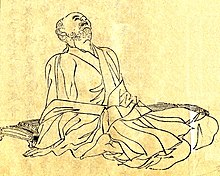Kamo no Chōmei
Japanese poet
Kamo no Chōmei (鴨 長明, 1153 or 1155–1216) was a Japanese author, poet (in the waka form), and essayist.

| This article on an author is a stub. You can help out with Wikiquote by expanding it! |
Quotes
edit"An Account of My Hut" (1212)
edit- Though the river's current never fails, the water passing, moment by moment, is never the same. Where the current pools, bubbles form on the surface, bursting and disappearing as others rise to replace them, none lasting long. In this world, people and their dwelling places are like that, always changing.
- Opening sentence
- When you see the ridgepoles of the impressive houses in Heian-kyo competing to rise above one another--dwellings of people of high status or of low--they look like they might stand for generations, but when you inquire you discover there are very few still standing from ages past. Some may have burned down just last year, and been rebuilt since. Or a mansion may have disappeared, to be replaced by smaller houses. Things change in the lives of the people living in those houses, too. There may be just as many people, but in places where I might have known twenty or thirty people in my youth, I may only recognize one or two now. Some die in the morning; others are born in the evening. That's the way it is with the people of this world--they are like those bubbles floating on the water.
- Nor is it clear to me, as people are born and die, where they are coming from and where they are going. Nor why, being so ephemeral in this world, they take such pains to make their houses pleasing to the eye. The master and the dwelling are competing in their transience. Both will perish from this world like the morning glory that blooms in the morning dew. In some cases, the dew may evaporate first, while the flower remains--but only to be withered by the morning sun. In others the flower may wither even before the dew is gone, but no one expects the dew to last until evening.
- Among the four great elements recognized by Buddhism, three--fire, water, and wind--are frequently associated with disasters, but earth is most often identified with stability. Still, in the Saiko era (540), I believe, there was an earthquake so severe that it damaged the neck of the Todaiji's Great Buddha so that the head fell off, and did unusual damage to many other things. But it was no match for the violence of the earthquake this time. Those who experienced this earthquake all talked about it that way at the time, that of all the miserable things in this world, it was the worst, seemed to be a thing of evil passions. But the days and months passed into years, and they came to deplore other things, so that you might go for a month now without meeting anyone talking about the earthquake.
- People respond to these disasters in terms of their own experience. Unless the disaster has struck them personally, their circumstances, their environment, it is dismissed as a superficial thing.
External links
edit- Encyclopedic article on Kamo no Chōmei on Wikipedia
- Japanese original text of Hōjōki on Aozora Bunko